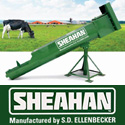Students to Take Part in Gateway to Ag Careers Program
USAgNet - 10/24/2025
Agriculture's long-term sustainability will rest on its ability to attract the best and brightest among the next generation of college graduates to build long-term careers in the industry. This is the main driver behind the Gateway to Ag Careers program, hosted by
AgGateway and sponsored by the AgCIO Roundtable, with additional support from Syngenta.
This year, six students were selected to participate in the program. "We're excited to be hosting these exceptional students at the 2025 Annual Meeting and Conference," says Brent Kemp, AgGateway President and CEO. "Interest in the program has continued
to grow over the years, and participants bring a wide range of interests and disciplines to the program."
The selected students will attend the 2025 AgGateway Annual Meeting and Conference to engage with attendees, sit in on educational sessions, and learn more about the many career opportunities that agriculture has to offer.
The following students will be participating in the 2025 Gateway to Ag Careers program:
· Omar Abdelmawgoud, Arizona State University
· Tristan Cravens, Illinois State University
· Jenna Kirkland, Arizona State University
· Emma Koger, Mississippi State University
· William Leiva-Mercaod, Iowa State University
· Patton Simbeck, Mississippi State University
The nomination process requires students to write an essay about their studies, interests, and reasons for wanting to participate in the program. This is submitted with a letter of recommendation and additional supporting documentation from their instructor or
adviser.
- AFBF Study: Farmers Urgently Need Economic Assistance
- U.S. Soybeans Set for First Chinese Shipment Since May
- Cranberry Production Forecast to Land Near Five-Year Average
- Tyson Foods to Close Nebraska Beef Processing Plant
- Deere Reports Lower Sales, Net Income During 2025
- Ag Secretary Leads Largest USDA Trade Mission to Mexico
- Land O'Lakes, Microsoft Working to Accelerate AI in Agriculture



